高中英语单元强化训练unit 2英语听力
- 格式:doc
- 大小:1.43 MB
- 文档页数:4
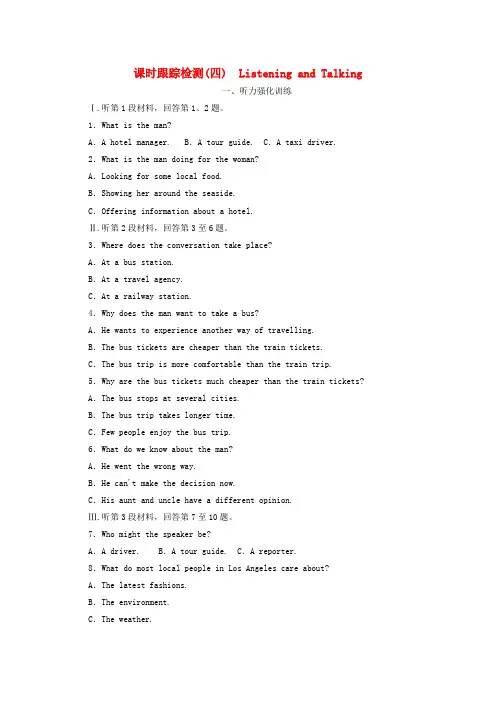
课时跟踪检测(四) Listening and Talking一、听力强化训练Ⅰ.听第1段材料,回答第1、2题。
1.What is the man?A.A hotel manager. B.A tour guide. C.A taxi driver. 2.What is the man doing for the woman?A.Looking for some local food.B.Showing her around the seaside.C.Offering information about a hotel.Ⅱ.听第2段材料,回答第3至6题。
3.Where does the conversation take place?A.At a bus station.B.At a travel agency.C.At a railway station.4.Why does the man want to take a bus?A.He wants to experience another way of travelling.B.The bus tickets are cheaper than the train tickets.C.The bus trip is more comfortable than the train trip.5.Why are the bus tickets much cheaper than the train tickets? A.The bus stops at several cities.B.The bus trip takes longer time.C.Few people enjoy the bus trip.6.What do we know about the man?A.He went the wrong way.B.He can't make the decision now.C.His aunt and uncle have a different opinion.Ⅲ.听第3段材料,回答第7至10题。
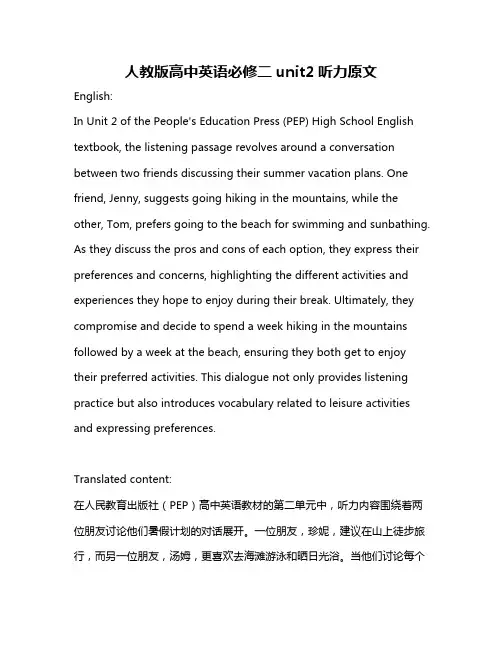
人教版高中英语必修二unit2听力原文English:In Unit 2 of the People's Education Press (PEP) High School English textbook, the listening passage revolves around a conversation between two friends discussing their summer vacation plans. One friend, Jenny, suggests going hiking in the mountains, while the other, Tom, prefers going to the beach for swimming and sunbathing. As they discuss the pros and cons of each option, they express their preferences and concerns, highlighting the different activities and experiences they hope to enjoy during their break. Ultimately, they compromise and decide to spend a week hiking in the mountains followed by a week at the beach, ensuring they both get to enjoy their preferred activities. This dialogue not only provides listening practice but also introduces vocabulary related to leisure activities and expressing preferences.Translated content:在人民教育出版社(PEP)高中英语教材的第二单元中,听力内容围绕着两位朋友讨论他们暑假计划的对话展开。
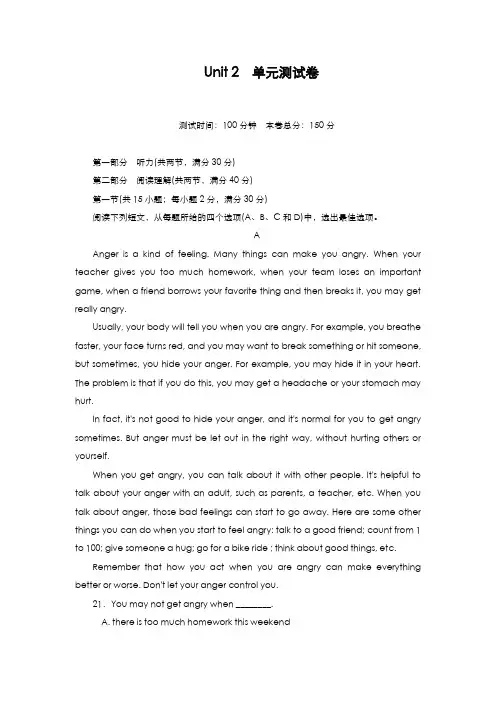
Unit 2 单元测试卷测试时间:100分钟本卷总分:150分第一部分听力(共两节,满分30分)第二部分阅读理解(共两节,满分40分)第一节(共15小题;每小题2分,满分30分)阅读下列短文,从每题所给的四个选项(A、B、C和D)中,选出最佳选项。
AAnger is a kind of feeling. Many things can make you angry. When your teacher gives you too much homework, when your team loses an important game, when a friend borrows your favorite thing and then breaks it, you may get really angry.Usually, your body will tell you when you are angry. For example, you breathe faster, your face turns red, and you may want to break something or hit someone, but sometimes, you hide your anger. For example, you may hide it in your heart. The problem is that if you do this, you may get a headache or your stomach may hurt.In fact, it's not good to hide your anger, and it's normal for you to get angry sometimes. But anger must be let out in the right way, without hurting others or yourself.When you get angry, you can talk about it with other people. It's helpful to talk about your anger with an adult, such as parents, a teacher, etc. When you talk about anger, those bad feelings can start to go away. Here are some other things you can do when you start to feel angry: talk to a good friend; count from 1 to 100; give someone a hug; go for a bike ride ; think about good things, etc.Remember that how you act when you are angry can make everything better or worse. Don't let your anger control you.21.You may not get angry when ________.A. there is too much homework this weekendB. your favorite basketball team wins the gameC. a friend breaks your favorite thingD. your parents don't let you watch TV22.________ doesn't show that you're angry.A. Taking a faster breathB. Getting a headacheC. Getting a stomachacheD. Wanting to protect someone23.According to the passage, you can do everything when you get angry EXCEPT ________.A. go for a bike rideB. think about good thingsC. talk to a good friendD. say bad things to the people around you答案:本文是一篇说明文,作者说明了生气时人的外在表现和内在影响,告诉人们应该尽量控制自己的情绪,尽量避免生气,同时给出了排解怒气的方法。
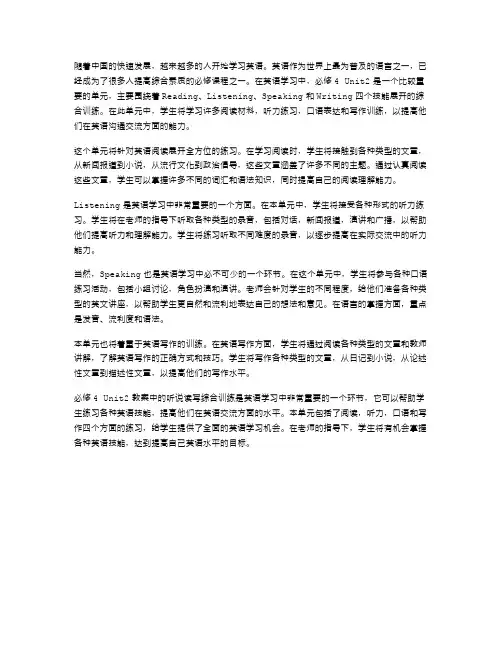
随着中国的快速发展,越来越多的人开始学习英语。
英语作为世界上最为普及的语言之一,已经成为了很多人提高综合素质的必修课程之一。
在英语学习中,必修4 Unit2是一个比较重要的单元,主要围绕着Reading、Listening、Speaking和Writing四个技能展开的综合训练。
在此单元中,学生将学习许多阅读材料,听力练习,口语表达和写作训练,以提高他们在英语沟通交流方面的能力。
这个单元将针对英语阅读展开全方位的练习。
在学习阅读时,学生将接触到各种类型的文章,从新闻报道到小说,从流行文化到政治倡导,这些文章涵盖了许多不同的主题。
通过认真阅读这些文章,学生可以掌握许多不同的词汇和语法知识,同时提高自己的阅读理解能力。
Listening是英语学习中非常重要的一个方面。
在本单元中,学生将接受各种形式的听力练习。
学生将在老师的指导下听取各种类型的录音,包括对话,新闻报道,演讲和广播,以帮助他们提高听力和理解能力。
学生将练习听取不同难度的录音,以逐步提高在实际交流中的听力能力。
当然,Speaking也是英语学习中必不可少的一个环节。
在这个单元中,学生将参与各种口语练习活动,包括小组讨论,角色扮演和演讲。
老师会针对学生的不同程度,给他们准备各种类型的英文讲座,以帮助学生更自然和流利地表达自己的想法和意见。
在语言的掌握方面,重点是发音、流利度和语法。
本单元也将着重于英语写作的训练。
在英语写作方面,学生将通过阅读各种类型的文章和教师讲解,了解英语写作的正确方式和技巧。
学生将写作各种类型的文章,从日记到小说,从论述性文章到描述性文章,以提高他们的写作水平。
必修4 Unit2教案中的听说读写综合训练是英语学习中非常重要的一个环节,它可以帮助学生练习各种英语技能,提高他们在英语交流方面的水平。
本单元包括了阅读,听力,口语和写作四个方面的练习,给学生提供了全面的英语学习机会。
在老师的指导下,学生将有机会掌握各种英语技能,达到提高自己英语水平的目标。

新人教版高中英语选修一Unit2听力材料
(打印版)
Unit2听力材料包括了多组对话和独白,主要涉及到时间管理、研究方法和校园生活等内容。
以下是每一部分的简要描述:
对话一:时间管理
对话中,两个人讨论了如何合理安排时间来完成研究任务和参
加课外活动。
他们提到了一些时间管理的技巧,如做好计划、合理
分配时间以及减少社交媒体的使用等。
最后,他们决定每天制定详
细的研究计划并互相监督。
对话二:研究方法
这组对话中,两个人分享了一些他们在研究中的经验和技巧。
其中包括制定研究目标、使用记忆法和找到适合自己的研究方式等。
他们还强调了练和复的重要性,并鼓励彼此互相研究和交流。
对话三:校园生活
在这个对话中,两个人讨论了校园生活中的一些常见问题,如
参加社团、遇到困难时该如何求助老师等。
他们提到了加入社团能
够帮助拓宽兴趣爱好和锻炼能力,同时也强调了互相帮助和团队合
作的重要性。
独白:自室规则
这段独白介绍了自室的规则和使用注意事项。
其中包括保持安静、合理使用自室设施和材料、不吃零食等。
独白还提到了自室是
一个优秀研究的环境,希望大家能够利用好这个资源。
以上是新人教版高中英语选修一Unit2听力材料的简要描述。
听力材料中涉及到了时间管理、研究方法和校园生活等方面的内容,对于学生们合理安排时间、提高研究效率和适应校园生活都具有一
定的指导意义。
以上。
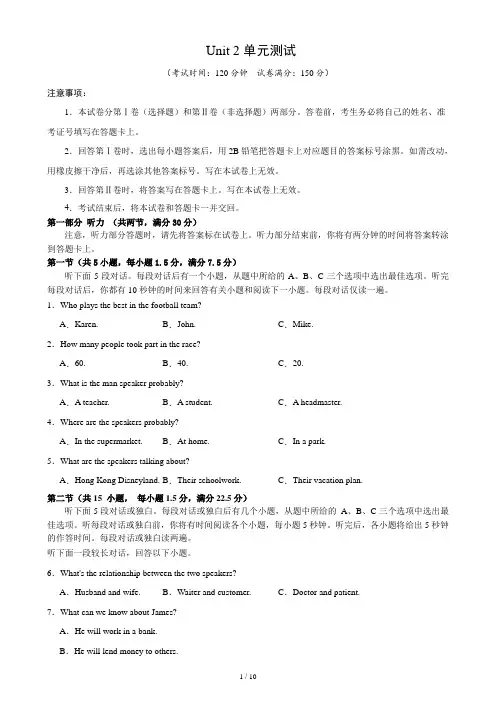
Unit 2单元测试(考试时间:120分钟试卷满分:150分)注意事项:1.本试卷分第Ⅰ卷(选择题)和第Ⅱ卷(非选择题)两部分。
答卷前,考生务必将自己的姓名、准考证号填写在答题卡上。
2.回答第Ⅰ卷时,选出每小题答案后,用2B铅笔把答题卡上对应题目的答案标号涂黑。
如需改动,用橡皮擦干净后,再选涂其他答案标号。
写在本试卷上无效。
3.回答第Ⅱ卷时,将答案写在答题卡上。
写在本试卷上无效。
4.考试结束后,将本试卷和答题卡一并交回。
第一部分听力(共两节,满分30分)注意,听力部分答题时,请先将答案标在试卷上。
听力部分结束前,你将有两分钟的时间将答案转涂到答题卡上。
第一节(共5小题,每小题1.5分,满分7.5分)听下面5段对话。
每段对话后有一个小题,从题中所给的A、B、C三个选项中选出最佳选项。
听完每段对话后,你都有10秒钟的时间来回答有关小题和阅读下一小题。
每段对话仅读一遍。
1.Who plays the best in the football team?A.Karen. B.John. C.Mike.2.How many people took part in the race?A.60. B.40. C.20.3.What is the man speaker probably?A.A teacher. B.A student. C.A headmaster.4.Where are the speakers probably?A.In the supermarket. B.At home. C.In a park.5.What are the speakers talking about?A.Hong Kong Disneyland. B.Their schoolwork. C.Their vacation plan.第二节(共15 小题,每小题1.5分,满分22.5分)听下面5段对话或独白。
每段对话或独白后有几个小题,从题中所给的A、B、C三个选项中选出最佳选项。
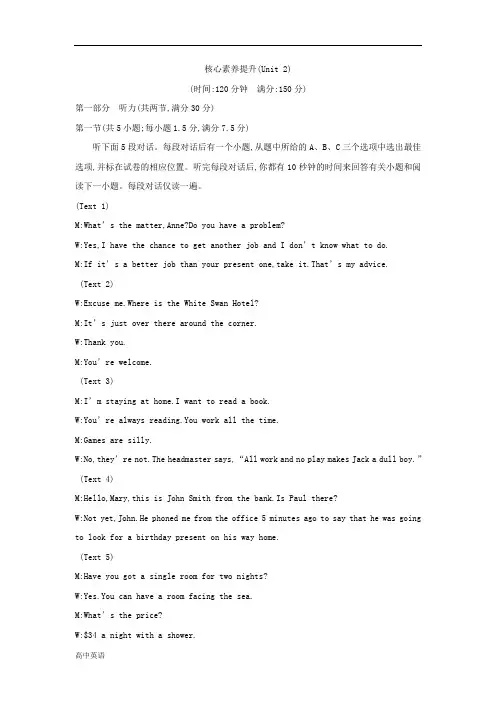
核心素养提升(Unit 2)(时间:120分钟满分:150分)第一部分听力(共两节,满分30分)第一节(共5小题;每小题1.5分,满分7.5分)听下面5段对话。
每段对话后有一个小题,从题中所给的A、B、C三个选项中选出最佳选项,并标在试卷的相应位置。
听完每段对话后,你都有10秒钟的时间来回答有关小题和阅读下一小题。
每段对话仅读一遍。
(Text 1)M:What’s the matter,Anne?Do you have a problem?W:Yes,I have the chance to get another job and I don’t know what to do.M:If it’s a better job than your present one,take it.That’s my advice.(Text 2)W:Excuse me.Where is the White Swan Hotel?M:It’s just over there around the corner.W:Thank you.M:You’re welcome.(Text 3)M:I’m staying at home.I want to read a book.W:You’re always reading.You work all the time.M:Games are silly.W:No,they’re not.The headmaster says,“All work and no play makes Jack a dull boy.” (Text 4)M:Hello,Mary,this is John Smith from the bank.Is Paul there?W:Not yet,John.He phoned me from the office 5 minutes ago to say that he was going to look for a birthday present on his way home.(Text 5)M:Have you got a single room for two nights?W:Yes.You can have a room facing the sea.M:What’s the price?W:$34 a night with a shower.第二节(共15小题;每小题1.5分,满分22.5分)听下面5段对话或独白。
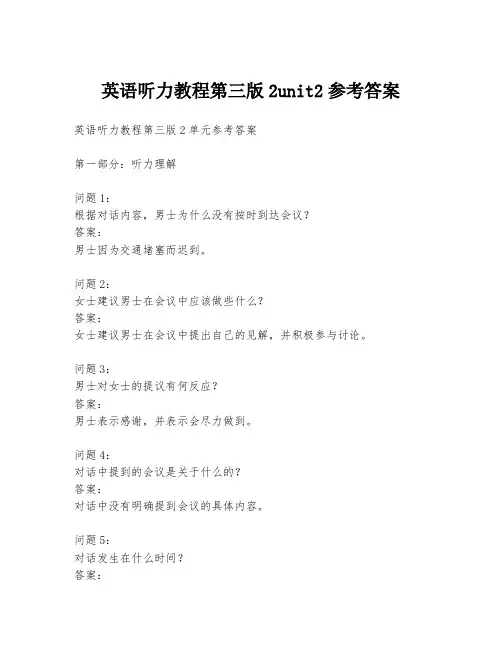
英语听力教程第三版2unit2参考答案英语听力教程第三版2单元参考答案第一部分:听力理解问题1:根据对话内容,男士为什么没有按时到达会议?答案:男士因为交通堵塞而迟到。
问题2:女士建议男士在会议中应该做些什么?答案:女士建议男士在会议中提出自己的见解,并积极参与讨论。
问题3:男士对女士的提议有何反应?答案:男士表示感谢,并表示会尽力做到。
问题4:对话中提到的会议是关于什么的?答案:对话中没有明确提到会议的具体内容。
问题5:对话发生在什么时间?答案:对话发生在男士迟到后,会议开始前。
第二部分:听力填空文本:在这段对话中,两位朋友讨论了他们的假期计划。
填空1:A: "I'm really looking forward to our trip next month."B: "Me too! I can't wait to __________."答案:visit new places填空2:A: "We should make a list of all the places we want to__________."B: "Good idea. I've already started one."答案:visit填空3:A: "I heard the weather is supposed to be really nice, so we can __________ every day."B: "That sounds perfect."答案:go out填空4:A: "Don't forget to pack your __________. We'll be hiking alot."B: "Right, I'll make sure to bring them."答案:hiking boots填空5:A: "And let's not forget to __________ our cameras. We'll want to capture all the beautiful views."B: "Absolutely, I've got my new camera ready."答案:bring第三部分:听力选择题问题6:What is the main topic of the lecture?A) The history of photography.B) The impact of technology on art.C) The evolution of music.D) The development of transportation systems.答案:B) The impact of technology on art.问题7:According to the speaker, what has been the most significant change in the art world in the past decade?A) The rise of abstract art.B) The popularity of street art.C) The influence of social media.D) The use of digital tools in creating art.答案:D) The use of digital tools in creating art.问题8:What does the speaker suggest for aspiring artists?A) To focus on traditional art forms.B) To embrace new technologies.C) To avoid using social media.D) To only create art for personal enjoyment.答案:B) To embrace new technologies.问题9:What is an example of how technology has changed the way artis experienced?A) Through virtual reality exhibitions.B) By limiting the types of art that can be created.C) By making it more difficult for artists to sell their work.D) By reducing the need for physical galleries.答案:A) Through virtual reality exhibitions.问题10:What conclusion does the speaker draw about the future of art?A) It will be dominated by traditional techniques.B) It will be heavily influenced by technology.C) It will become less accessible to the public.D) It will lose its emotional impact.答案:B) It will be heavily influenced by technology.第四部分:听力简答题问题11:What are the three main reasons the speaker gives for the popularity of online shopping?答案:The three main reasons are convenience, variety, and competitive pricing.问题12:How does the speaker describe the relationship between online shopping and traditional retail stores?答案:The speaker describes it as a complementary relationship, where online shopping offers an alternative but does not completely replace traditional retail stores.问题13:What is the speaker's opinion on the future of brick-and-mortar stores?答案:The speaker believes that brick-and-mortar stores will continue to exist but will need to adapt to the changing market by integrating online and offline experiences.第五部分:听力判断题问题14:The article mainly discusses the benefits of learning a second language.答案:True问题15:According to the article, learning a second language can improve cognitive abilities.答案:True问题16:The article suggests that learning a second language is only beneficial for children.答案:False问题17:The article claims that multilingualism can lead to better job opportunities.答案:True问题18:The article concludes that learning a second language has no cultural benefits.答案:False请注意,以上内容是根据提供的标题虚构。
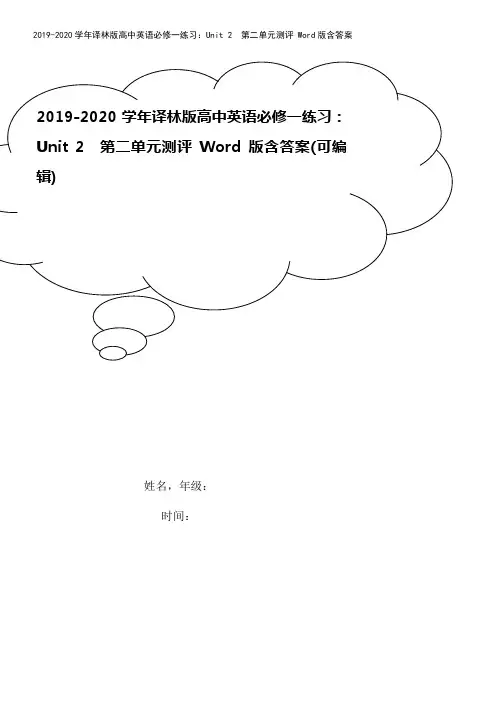
姓名,年级:时间:第二单元测评(时间:120分钟满分:150分)第Ⅰ卷第一部分听力(共两节,满分30分)第一节(共5小题;每小题1。
5分,满分7.5分)听下面5段对话。
每段对话后有一个小题,从题中所给的A、B、C三个选项中选出最佳选项,并标在试卷的相应位置。
听完每段对话后,你都有10秒钟的时间来回答有关小题和阅读下一小题。
每段对话仅读一遍。
1。
How will the woman probably get to Yale University?A。
By car. B.By bus. C.By subway.2。
Where does the conversation probably take place?A.In a library。
B.At a book store.C。
In a classroom.3.How many students are good at basketball this year? A。
About 20. B。
About 30。
C.About 40。
4.What are the speakers mainly talking about?A.A hotel。
B.A trip。
C。
Tickets.5.What does the man want?A。
Water。
B。
Juice。
C。
Coca—cola。
第二节(共15小题;每小题1.5分,满分22.5分)听下面5段对话或独白。
每段对话或独白后有几个小题,从题中所给的A、B、C三个选项中选出最佳选项,并标在试卷的相应位置。
听每段对话或独白前,你将有时间阅读各个小题,每小题5秒钟;听完后,各小题将给出5秒钟的作答时间。
每段对话或独白读两遍.听第6段材料,回答第6、7题。
6。
How many customers do they have today?A.2。
B。
6. C。
More than 6.7。
How does the man feel now?A.Happy.B.Calm.C.Worried。
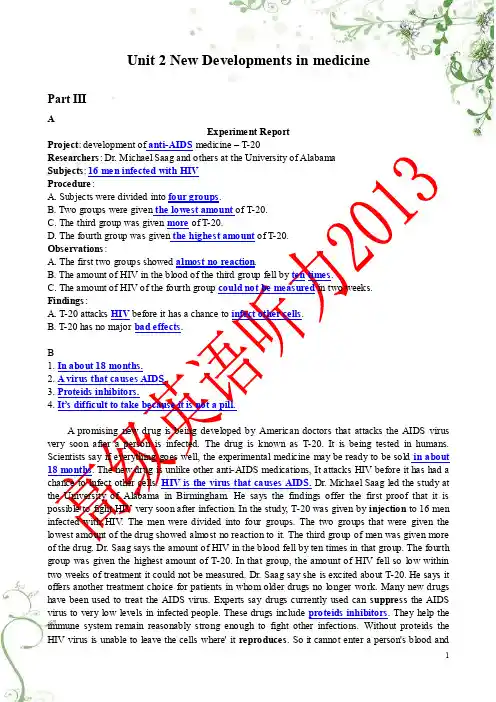
Unit 2 New Developments in medicinePart IIIAExperiment ReportProject: development of anti-AIDS medicine – T-20Researchers: Dr. Michael Saag and others at the University of AlabamaSubjects: 16 men infected with HIVProcedure:A. Subjects were divided into four groups.B. Two groups were given the lowest amount of T-20.C. The third group was given more of T-20.D. The fourth group was given the highest amount of T-20.Observations:A. The first two groups showed almost no reaction.B. The amount of HIV in the blood of the third group fell by ten times.C. The amount of HIV of the fourth group could not be measured in two weeks.Findings:A. T-20 attacks HIV before it has a chance to infect other cells.B. T-20 has no major bad effects.B1. In about 18 months.2. A virus that causes AIDS.3. Proteids inhibitors.4. I t’s difficult to take because it is not a pill.A promising new drug is being developed by American doctors that attacks the AIDS virus very soon after a person is infected. The drug is known as T-20. It is being tested in humans. Scientists say if everything goes well, the experimental medicine may be ready to be sold in about 18 months. The new drug is unlike other anti-AIDS medications, It attacks HIV before it has had a chance to infect other cells. HIV is the virus that causes AIDS. Dr. Michael Saag led the study at the University of Alabama in Birmingham. He says the findings offer the first proof that it is possible to fight HIV very soon after infection. In the study, T-20 was given by injection to 16 men infected with HIV. The men were divided into four groups. The two groups that were given the lowest amount of the drug showed almost no reaction to it. The third group of men was given more of the drug. Dr. Saag says the amount of HIV in the blood fell by ten times in that group. The fourth group was given the highest amount of T-20. In that group, the amount of HIV fell so low within two weeks of treatment it could not be measured. Dr. Saag say she is excited about T-20. He says it offers another treatment choice for patients in whom older drugs no longer work. Many new drugs have been used to treat the AIDS virus. Experts say drugs currently used can suppress the AIDS virus to very low levels in infected people. These drugs include proteids inhibitors. They help the immune system remain reasonably strong enough to fight other infections. Without proteids the HIV virus is unable to leave the cells where' it reproduces. So it cannot enter a person's blood andinfect other cells. Researchers say T-20 also may offer a second chance to patients who are unable to deal with the bad effects of proteids inhibitors and other anti-AIDS drugs. Experts say there were no major bad effects of T-20 in their study. Researchers say T-20 appears to be at least as effective as existing anti-AIDS treatments. However, some say they are concerned that the drug is difficult to take because it is not a pill that can be swallowed. Researchers are doing more studies to see if T-20 in a pill form would be as effective.Questions:1.When might people be able to purchase T-20 on the market?2.What is HIV?3.What do the currently used anti-AIDS drugs include?4.What are some scientific concerns about the new drug?Why?。
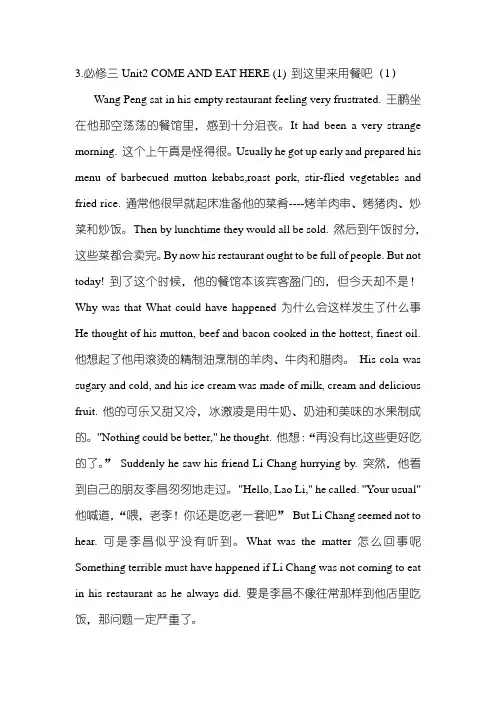
3.必修三Unit2 COME AND EAT HERE (1) 到这里来用餐吧(1)Wang Peng sat in his empty restaurant feeling very frustrated. 王鹏坐在他那空荡荡的餐馆里,感到十分沮丧。
It had been a very strange morning. 这个上午真是怪得很。
Usually he got up early and prepared his menu of barbecued mutton kebabs,roast pork, stir-flied vegetables and fried rice. 通常他很早就起床准备他的菜肴----烤羊肉串、烤猪肉、炒菜和炒饭。
Then by lunchtime they would all be sold. 然后到午饭时分,这些菜都会卖完。
By now his restaurant ought to be full of people. But not today! 到了这个时候,他的餐馆本该宾客盈门的,但今天却不是!Why was that What could have happened 为什么会这样发生了什么事He thought of his mutton, beef and bacon cooked in the hottest, finest oil. 他想起了他用滚烫的精制油烹制的羊肉、牛肉和腊肉。
His cola was sugary and cold, and his ice cream was made of milk, cream and delicious fruit. 他的可乐又甜又冷,冰激凌是用牛奶、奶油和美味的水果制成的。
"Nothing could be better," he thought. 他想:“再没有比这些更好吃的了。
选择性必修第二册Unit 2 Bridging Cultures单元测试卷姓名:___________学号:_________得分:____________I.听力测试。
(每个1.5分)1.Where is the woman?A.In a soap factory.B.In her house.C.At an information desk.2.What's the weather like?A.Windy and rainy.B.Windy and snowy.C.Windy and cloudy.3.What happened to the man's son?A.He got hurt in an accident.B.He fell into a river.C.He lost his bike.4.How did the man know about the fire?A.He saw it.B.He heard it over the radio.C.He watched it on TV.5.Why is the man sad?A.He is out of work.B.He is in poor health.C.His son is ill.第二节(共15小题;每小题1.5分,满分22.5分)听下面5段对话或独白。
每段对话或独白后有几个小题,从题中所给的A、B、C三个选项中选出最佳选项。
听每段对话或独白前,你将有时间阅读各个小题,每小题5秒钟;听完后,各小题将给出5秒钟的作答时间。
每段对话或独白读两遍。
听第6段材料,回答第6、7题。
6.What part of the woman's body hurts?A.Her neck.B.Her back.C.Her arms.7.What does the man suggest the woman do?A.Take regular breaks.B.Spend less time on the computer.C.Relax her arms every half hour.8.What activity does the man want to attend?A.V olunteer activity.B.Out-of-class activity.C.Community activity.9.Why does the man want to help the disabled people or the left-behind children? A.They live an unhappy life.B.They lack care and attention.C.They are not confident.10.What will the man do with the old people at the old people's home? A.Singing and dancing with them weekly.B.Chatting with them regularly.C.Playing games with them happily.11.What does the man think of the first car?A.It's too ugly.B.It's too small.C.It's too expensive.12.Which car has seven seats?A.The red one.B.The blue one.C.The green one.13.What will the man do next?A.Take a test drive.B.Talk to his family.C.Buy the car immediately.14.What are the speakers mainly talking about?A.Their history project.B.Their English project.C.Their geography project.15.How many people are there in the group?A.Three. B.Four. C.Five.16.What is the second part of the project?A.To organize an activity.B.To do some research.C.To create a poster.17.Who will find the poster materials?A.Jane. B.Arthur. C.Debbie.18.What caused Wilson's blindness?A.An accident.B.A sports injury.C.An eye disease.19.Why did blindness in Africa shock Wilson?A.It was caused by drugs.B.There was no known cure.C.Most cases were preventable.20.What did Wilson's organization do in Africa?A.It reduced blindness by 10%.B.It discovered a new drug in 1960.C.It carried out millions of eye surgery.II.单词填空。
Unit2 Exploring English 单元测试一、听力(略)(1-20题)二、阅读理解阅读下列短文,从每题所给的A、B、C和D四个选项中,选出最佳选项。
AA student is learning to speak British English. He wonders: Can I communicate with Americans? Can they understand me? Learners of English often ask: What are the differences between British and American English? How important are these differences?Certainly, there are some differences between British and American English. There are a few differences in grammar. For example, speakers of British English say “in hospital” and “Have you a pen?”, Americans say “in the hospital” and “Do you have a pen?”. Pronunciation is sometimes different. Americans usually sound theirs in words like “bird” and “hurt”. Speakers of British English do not sound theirs in these words. There are differences between British and American English in spelling and vocabulary. For example, “colour” and “honour” are British, “color” and “honor” are American.These differences in grammar, pronunciation, spelling and vocabulary are not important, however. For the most part, British and American English are the same language.21. According to this passage, a student who is learning to speak American English might be afraid that ________.A. the grammar is too hard for himB. American people cannot understand himC. British people cannot understand himD. the spelling is too hard for him22. What is NOT mentioned(提及) in the passage? ________A. How important the differences are.B. Whether British English and American English are one language or two.C. Whether there are differences between British English and American English.D. How the differences between British English and American English came about.23. Most ________ say “Do you have a watch?”A. AmericansB. British peopleC. childrenD. teachersBPutonghua is the official language on the mainland, but if history had played out differently, most of the people could have been speaking Cantonese.高中英语必修第一册1/ 11In 1912, shortly after the end of the Qing dynasty, the founding fathers of the republic met to decide which language should be spoken in the new China.Mandarin now known as Putonghua was just a northern dialect spoken by the hated Manchurian officials at that time. While it had served as China’s lingua franca(混合语) for centuries, many saw it as an “impure form” of Chinese.Many of the leaders, including Sun Yat-sen, were from Guangdong ——where people are open to new ideas. A great debate started and eventually led to a formal vote. Cantonese lost out by a small margin to Putonghua and the rest is history.While historians today still argue about whether this story is real, it is something Guangdong people love to tell. Many Cantonese speakers feel proud of their native language, saying it has more in common with the classical Chinese than Putonghua ——which is a mix of northern dialects heavily influenced by Manchurian and Mongolian.Linguists agree to some degree. “Cantonese is closer to classical Chinese in its pronunciation and some grammar,” Jiang Wenxian, a Chinese language scholar, said. “Using Cantonese to read classical poetry is a real pleasure,” he said. “Many ancient poems don’t rhyme(押韵) when you read them in Putonghua, but they do in Cantonese.”“Cantonese keeps a flavor of ancient Chinese. Nowadays few people understand classical Chinese, so Cantonese should be protected as a type of language fossil helping us study ancient Chinese culture.”Cantonese is spoken by about 70 million people in Guangdong, Hong Kong, Macau and communities abroad.In the 17th and 18th centuries, Guangdong was the only Chinese province allowed to trade directly with foreigners. Many Westerners at the time learned Cantonese. Up till very recently, there were more Cantonese speakers in overseas Chinese communities than Putonghua speakers. In Canada, for example, Cantonese is the third most commonly spoken language after English and French.24. What’s the function of the first paragraph?A. To introduce the topic.B. To attraction people’s attention.C. To summarize the whole passage.D. To show the importance of Putonghua.25. What can we learn from the fourth paragraph?A. Most of the leaders are in favor of Putonghua.B. Most of the leaders came from Guangdong at that time.C. Guangdong people are more likely to accept new ideas.D. Sun Yat-sen suggested having a debate to decide on the new language.高中英语必修第一册2/ 1126. Why Cantonese should be protected as a type of language fossil?A. Because it’s as important as Putonghua.B. Because it is an ancient language with a long history.C. Because nowadays few people can understand Cantonese.D. Because it is very helpful when studying Chinese culture.27. Which of the following can be the best title for the text?A. New language, New China.B. How Putonghua defeated CantoneseC. The development of an official languageD. Cantonese almost became the official languageCThe English language started about 1,500 years ago in England. Three groups of people came to the country. They were the Angles, the Saxons, and the Jutes. These three groups brought their languages with them to England-After some time, the three languages became one new-language-English. The name “English” comes from the Angles. They lived in most of England. “England” means “Angle Land” or “Country of the Angles”.The language that we speak today —Modern English —is not the same as the English that people used many years ago, including Old English (before 1150) and Middle English (up till 1500). That language —Old English —sounds different, and it has some different rules of grammar. There were only a few thousand words in Old English. But Modern English does come from Old English, and it is still like it in many important ways.28. When did Modern English start?A. About the year 1150.B. Before the year 1500.C. Between tile 12th century and tile 16th century.D. About the year 1500.29. How many languages did Old English come from?A. One.B. Two.C. Three.D. Four.30. Which language did the name “English” come from?A. Modern English.B. The Angles.C. The Jutes.D. The Saxons.31. According to the passage, Modern English differs from Old English in ________.A. grammarB. pronunciationC. wordsD. All of the aboveDIf you want to become a fluent English speaker, you should take some advice: there are four skills in learning English. They are listening, speaking, reading and writing. The most important thing you must remember is that if you want to improve your speaking and writing skills you should first master the skills of reading and listening.Read as much as you can. But your reading must be active. It means that you must think about高中英语必修第一册3/ 11the meaning of the sentences, the meaning of the unfamiliar words, etc.There is no need for you to pay much attention to grammar ——or try to understand all the unfamiliar words you come across, but the fact you see them for the first time and recognize them whenever you see them, for example in other passages or books, is enough. It would be better to prepare yourself a notebook so you can write down the important words or sentences in it.As for listening, there are two choices: besides reading, you can listen every day for about 30 minutes. You can only pay attention to your reading and become skillful at your reading, then you can catch up on your listening. Since you have lots of inputs in your mind, you can easily guess what the speaker is going to say. This never means that you should not practice listening.For listening you can listen to cartoons or some movies that are specially made for children. Their languages are easy. Or if you are good at listening, you can listen to VOA or BBC programs every day. Again the thing to remember is being active in listening and preferably taking some notes.If you follow these pieces of advice, your speaking and writing will improve automatically, and you can be sure that with a little effort they will become perfect.32. According to the author, which should you improve first among the four skills? ________A. Reading and listeningB. Reading and writingC. Writing and speakingD. Speaking and listening33. To improve your reading, when you read you should ________.A. look up all the new words in the dictionaryB. think about what you are reading activelyC. spend more time studying grammarD. copy as many words and sentences as possible34. The underlined words “come across” in paragraph3 probably be replaced by ________.A. meet by accidentB. discoverC. find on purposeD. look for35. The author seems to agree with the view that ________.A. everyone should listen to VOA or BBC programs every dayB. you needn’t practice listening if you keep in reading every dayC. being good at reading is helpful in improving your listeningD. you should take notes of whatever you are hearing根据短文内容,从短文后的选项中选出能填入空白处的最佳选项。
第二单元测评(时间:120分钟满分:150分)第一部分听力(共两节,满分30分)第一节(共5小题;每小题1.5分,满分7.5分)听下面5段对话。
每段对话后有一个小题,从题中所给的A、B、C三个选项中选出最佳选项。
听完每段对话后,你都有10秒钟的时间来回答有关小题和阅读下一小题。
每段对话仅读一遍。
1.Where does the conversation most likely take place?A.In the library.B.In a store.C.In the booking office.2.Who is most likely to have an electronic dictionary?A.Linda.B.The woman.C.The man.3.How does the woman find her decoration?A.It’s not modern.B.It’s just so-so.C.It’s up to date.4.How long will the woman be off?A.A day.B.A morning.C.An afternoon.5.How will the man go to Beijing?A.By train.B.By bus.C.By plane.第二节(共15小题;每小题1.5分,满分22.5分)听下面5段对话或独白。
每段对话或独白后有几个小题,从题中所给的A、B、C三个选项中选出最佳选项。
听每段对话或独白前,你将有时间阅读各个小题,每小题5秒钟;听完后,各小题将给出5秒钟的作答时间。
每段对话或独白读两遍。
听第6段材料,回答第6至8题。
6.What month is it most likely now?A.January.B.March.C.June.7.What season was the BEST season last year?A.Spring.B.Summer.C.Autumn.8.When was the nice period last year?A.September and October.B.October and November.C.March and April.听第7段材料,回答第9至11题。
高中英语单元强化训练Unit 2本卷贰O贰贰年贰月捌日编写;出题人:令狐学复;欧阳化语;令狐理总。
I. 听下面11段对话,每段对话后有一个小题,从题中所给的A、B、C三个选项里面选出最正确选项。
每段对话仅读一遍。
〔〕1. What’s the relationship between the two speakers?A. FriendsB. Husband and wifeC. Waitress and customer〔〕2. What’s the probable relationship between the two speakers?A. A teacher and a studentB. A doctor and his patientC. A teacher and his daughter〔〕3. Who is the woman most probably speaking to?A. A railway porterB. A bus conductorC. A post clerk〔〕4. What’s the relationship between the two speakers?A. ClassmatesB. Parent and childC. Shop assistant and customer〔〕5. What’s the relationship between the two people?A. Father and sonB. Teacher and studentC. Doctor and patient〔〕6. What’s the probable relationship between the man and the woman?A. Taxi driver—customerB. Conductor—driverC. Boss—driver〔〕7. Why does the man apologize to the woman?A. He had to say goodbye to his friend at the airport.B. He didn’t go to the woman’s party last night.C. He had to go to another city with his friend.〔〕8. How does the woman feel?A. Very gladB. Very painfulC. A little angry〔〕9. How many people are mentioned in the dialogue?A. TwoB. ThreeC. Four〔〕10. What do you learn from the dialogue?A. The woman watched the basketball game and enjoyed it.B. The woman regretted to have missed the basketball game.C. The woman will watch the basketball game tonight.〔〕11. Which of the following pictures is right according to the dialogue?II. 听以下对话,根据对话内容选择最正确答案。
高中英语单元强化训练Unit 2I. 听下面11段对话,每段对话后有一个小题,从题中所给的A、B、C三个选项中选出最佳选项。
每段对话仅读一遍。
()1. What’s the relationship between the two speakers?A. FriendsB. Husband and wifeC. Waitress and customer()2. What’s the probable relationship between the two speakers?A. A teacher and a studentB. A doctor and his patientC. A teacher and his daughter()3. Who is the woman most probably speaking to?A. A railway porterB. A bus conductorC. A post clerk()4. What’s the relationship between the two speakers?A. ClassmatesB. Parent and childC. Shop assistant and customer()5. What’s the relationship between the two people?A. Father and sonB. Teacher and studentC. Doctor and patient()6. What’s the probable relationship between the man and the woman?A. Taxi driver—customerB. Conductor—driverC. Boss—driver()7. Why does the man apologize to the woman?A. He had to say goodbye to his friend at the airport.B. He didn’t go to the woman’s party last night.C. He had to go to another city with his friend.()8. How does the woman feel?A. Very gladB. Very painfulC. A little angry()9. How many people are mentioned in the dialogue?A. TwoB. ThreeC. Four()10. What do you learn from the dialogue?A. The woman watched the basketball game and enjoyed it.B. The woman regretted to have missed the basketball game.C. The woman will watch the basketball game tonight.()11. Which of the following pictures is right according to the dialogue?II. 听下列对话,根据对话内容选择最佳答案。
对话读两遍。
()1. What can the man be?A. A firefighterB. A bodyguardC. A policeman()2. What is the relationship between the man and the woman?A. Doctor and patientB. Husband and wifeC. NeighboursIII. 听下面一段短文,完成1~4小题。
短文读两遍。
()1. How old is the speaker now?A. SeventeenB. Twenty-oneC. Nineteen()2. What did he do to make money when he was 6?A. He delivered newspapers to his neighbors.B. He cleaned cars for his neighbors.C. He cut grass for his neighbors.()3. What kind of company is he running?A. A company doing international trade.B. A computer company.C. A company that makes music records.()4. How much benefit will be brought in next year?A. $ 50,000B. $ 55,000C. $ 60,000Unit 2听力原文:I. 听下面11段对话,每段对话后有一个小题,从题中所给的A、B、C三个选项中选出最佳选项。
每段对话仅读一遍。
1. W: More coffee?M: Please darling. Well, where is Jane?W: She is upstairs, in her bedroom.2. M: Could you please explain the homework for Monday, Miss Smith?W: Certainly. Read the next chapter in your textbook and come to class prepared to discuss what you’ve read.3. W: Excuse me, sir. I’m going to post this parcel to London.M: Let me see. It’s one pound fifty pence.4. M: Could you please tell me what Mr Church set you last time? You see I was absent then.W: Well, he gave us a special assignment on the anniversary of Lincoln’s birthday.5. W: Jack, I expected to see your homework this morning.M: Can I hand it in this afternoon?6. M: Where to, Miss?W: Please drop me off at the King’s Department Store.M: On the east side?W: No. The west side, near the Stadium.7. W: I expected you’d come to my birthday party yesterday.M: I’m terribly sorry, Susan. I had to see off a friend of mine at the airport last night.8. M: I must apologize for not meeting you at the airport this afternoon. You must have been unhappy.W: Well, you should have let me know that you weren’t coming.9. M: I’m sorry to have kept both of you waiting. The car was held up in the traffic.W: That’s all right. We just got here ourselves.10. M: It’s a pity that you didn’t watch yesterday’s basketball game.W: Really it is. But I’ve heard that our team won the game.11. W: Have you heard that Mr Liu died this morning?M: Oh, no! I can’t believe it. Last night I saw him in his lab.W: But it’s true. He was hit by a car at about 6:30.M: A misfortune seems to drop from Heaven! What a terrible tragedy!II. 听下列对话,根据对话内容选择最佳答案。
对话读两遍。
W: Oh, Tim. What happened to you?M: It isn’t anything serious.W: It’s serious enough for you to be in hospital.M: Just a little too much smoke. I’ll be back home this evening.W: How did it happen?M: I had to go into a house that was on fire. There was still someone inside.W: Did you get him out?M: It was a little girl. Yes, I got her out.W: But there was a lot of smoke?M: Yes, a lot. I had some trouble breathing, so they sent me here just for the doctors to take a look at me.W: And now you’ll tell me that it’s all part of the job.M: Well, yes, it is. You shouldn’t worry all the time.W: But I do. I hope that you’ll give up the work.M: Give up? No, not because of a little smoke. I’m really all right.III. 听下面一段短文,完成1~4小题。